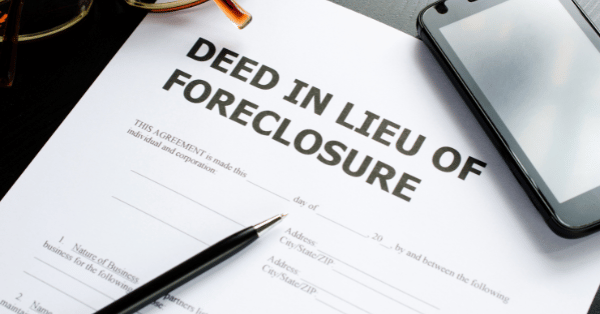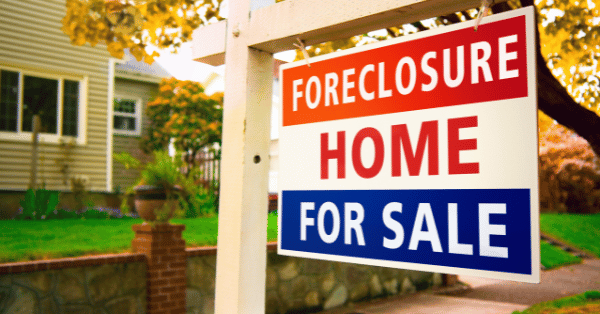Deed in Lieu of Foreclosure: Is It the Right Option for You?
Are you up to your neck in mortgage payments, but you don’t want the bank to foreclose on your loan? Well, you might want to consider a deed in lieu of foreclosure.
This is an option that can be advantageous for both you and your lender. It’s a win-win situation that may be able to get you out of a jam during tough times.
Here, we’ll discuss what a deed in lieu is, what it means, and how you should go about it.
What is a Deed in Lieu of Foreclosure?
A deed in lieu of foreclosure is when you hand the deed back to your bank or lender instead of them going through the full foreclosure proceedings. The definition, “in lieu of” meaning, “instead of”.
If you are behind on your mortgage payments, or you may see yourself falling behind in the near future, it allows you to leave your house gracefully without any large impact on your credit.
You can find a sample deed in lieu of agreement here from the SEC.
It gets expensive for banks to pay for attorneys to follow through with a foreclosure process. It also can be a lengthy process. For many lenders, it is advantageous for them to accept a deed in lieu because it allows them to save the time and money it would take for them to follow through on the foreclosure process.
This will usually also relieve you of any mortgage debt that is remaining on the property after you transfer the ownership back to the lender. Some lenders may even give you a few thousand dollars to relocate by choosing this option. This is where the term “cash for keys” comes from. There may also be programs in place that will help you with finding a new residence.
A deed in lieu may not always be an available option, depending on your lender. Your lender may also want to see that you tried other options, such as a short sale or a loan modification, before exploring the possibility of a deed in lieu.
What Does a Deed in Lieu Mean?
A deed in lieu essentially means that you’re transferring ownership back to the lender to avoid foreclosure. It typically allows you to avoid the financial burden of any mortgage debt, liens or deficiency judgments that may be outstanding on the residence. However, a lender has no obligation to accept a deed in lieu.
As we mentioned earlier, it may relinquish the debts you have outstanding on the home, but sometimes it does not. If you submit your deed in lieu, and your lender was not aware of any outstanding debt on the mortgage, they may come back and sue you later.
This requires both parties to sign a waiver of the deficiency balance so that they can’t take legal action against you for any debts that you owe on the property. Now, let’s move on and explore the nitty-gritty of foreclosure and its implications.
Understanding How a Foreclosure Impacts You
The transfer of property by foreclosure of a mortgage loan can be a difficult situation for any homeowner. The lender finds you delinquent on your home, and they are taking legal action to repossess the property. This can severely impact your credit as well as your personal reputation. Here are just a few of the ways a foreclosure can impact your life:
- Loss of Your Home: Although it will happen anyway, even with a deed in lieu, it’s important that our readers are clear on the impact of each situation. You probably have some sort of personal attachment to your home, especially if you’ve lived there for a while. You’ll be saying goodbye to a place where many cherished memories were created.
- Devastating Impact on Your Credit Score: A foreclosure can drop your credit score by as much as 100 points, and it can stay on your credit score for up to seven years. This will make getting another mortgage difficult for the foreseeable future.
- Stress and Uncertainty: The stress of all of the entire process can be mentally and emotionally draining. It’s not just the impact of losing your home and having to find somewhere else to live, the complex legal process, along with the embarrassment of getting foreclosed on, can compound the level of stress you may experience.
Realizing the gravity of this possible scenario is the reason many homeowners start looking at articles such as this to explore other options, such as a deed in lieu.
The Difference between Deed in Lieu and Foreclosure
There are some key differences between a deed in lieu and foreclosure. Both options will involve the loss of the property, but there are many ways they contrast each other. You may have pointed out some of them over the course of reading this article, but we’ll outline it here.
The biggest difference between the two is how they impact your credit score. A deed in lieu will impact your credit score about half as much as a foreclosure. Also a deed in lieu will last for four years on your credit report, but a foreclosure will last up to seven.
There are two different types of foreclosures:
Nonjudicial Foreclosure – A lender will foreclose on the property without legal action. States such as California and Texas use a nonjudicial procedure unless a deed in lieu of foreclosure or other option takes place
Judicial Foreclosure – The lender will take legal action to foreclose and seize the property. States such as Florida and Vermont will use a judicial procedure unless a deed in lieu of foreclosure or other option takes place.
Each state has different laws on how a foreclosure can and should occur. The deed in lieu is basically a nonjudicial foreclosure that is initiated by you instead of the lender.
Pros and Cons of a Deed in Lieu
| Pros | Cons |
| Win-Win for both lender and homeowner | Will be very difficult to obtain another mortgage within the next four years after the deed in lieu |
| The residence may be eligible to lease back to the homeowner at a later time | The amount that is owed on the property may still be more than the amount it is worth |
| Can significantly reduce the amount of debt that may be owed on the property | Significantly impacts your credit score |
Why a Lender Might Reject or Accept your Deed in Lieu Proposal
It’s always a great idea to keep your house in good condition. Not just because it makes for a better living experience, but because you really never know when you’ll have to turn around and sell it quickly or give it back to the bank.
The condition a home is in is a huge factor when trading hands, no matter the circumstance. It’s also a huge factor when proposing a deed in lieu. This is because the condition of the residence impacts its value. If the value of the home is less than what you still owe on the mortgage, you may have a hard time convincing your lender to take it back without holding you responsible for the remaining debt.
Other factors may include:
Delinquency: How far you are already behind on your payments is going to be a significant factor in deciding if your lender agrees to your deed in lieu. If you have been consistently missing your mortgage payment over a substantial period, this will actually increase the chance they will accept your proposal. If you’re mostly caught up, or just one or two payments behind, they may be more hesitant. This is usually because they may believe that you can explore other options to keep making payments instead of going through the hassle of trying to resell the house.
Mortgage Balance: If the balance of your mortgage is still relatively high, they may go ahead and foreclose on the house, because there is still a lot of money to be made on it. However, if the house is almost paid off, or it is relatively low, they may be more willing to accept a deed in lieu because there is less risk to their bottom line. Since there is not much money left in the mortgage, they won’t want to risk spending more in legal fees to foreclose on the house than it’s worth. If they have recently purchased your mortgage note from another lender, they may not be so apt to accept a deed in lieu as well.
Property Value: If the property is worth less than the balance on the mortgage, a lender may be more inclined to take a deed in lieu. For many of the same reasons as our last point, they may find difficulty reselling the home for more than it’s worth. If this is the case, they may not be interested in signing the relevant paperwork to cancel the debt on your behalf, however.
Market Conditions: During the subprime mortgage crisis of 2008, many lenders were accepting deeds in lieu, due to the volatile landscape of the economy at the time. In times when the real estate market is slow or there is an economic downturn, lenders are more likely to accept a deed in lieu.
Resell Opportunity: Conversely, in the case of a particularly good real estate market, a lender may accept a deed in lieu if it seems they can resell the house quickly. This is usually in cases when the market is booming, the home is in great condition, it’s a buyer’s market, and its property value is favorably proportional to the mortgage balance.
Alternative Options to a Deed in Lieu
If you decide that a deed in lieu (and certainly foreclosure) is not for you, there are other options:
Loan Modification: This involves reworking the terms of your deed of trust with your lender to make your mortgage payments more affordable.
Short Sale: In a short sale, you sell your home for less than the amount of the balance of your mortgage. This does require lender approval. Less effort is required in a deed in lieu vs a short sale where you have to find a new mortgage buyer yourself.
Bankruptcy: A last resort, in many cases, but it will relieve you of any and all debts you owe on your credit report, except for a few categories. However, foreclosure is included in bankruptcy.
It’s best to explore every option available to you if you want to avoid impacting your credit for a while. However, if you find yourself in deep water and your mortgage lender is willing to accept the deed in lieu, it may help you avoid greater financial hardship in the long run.






